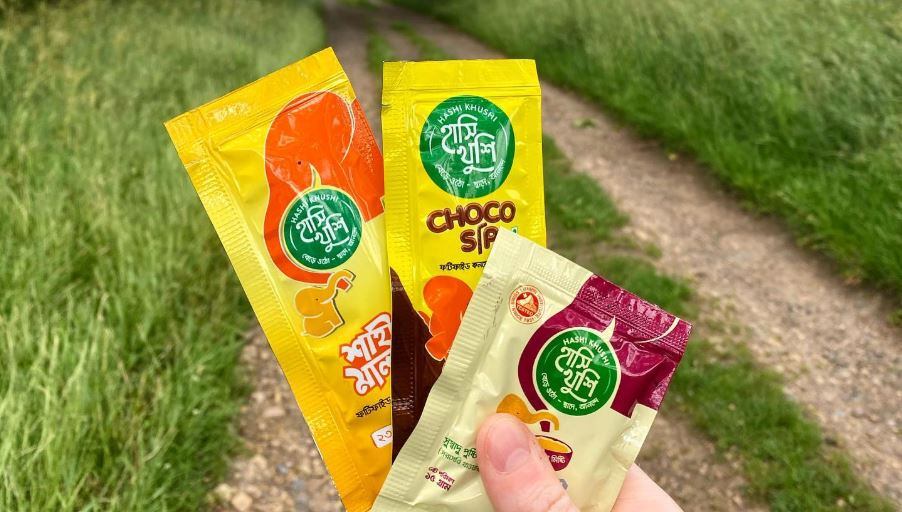The financing will help expand access to affordable and commercially sustainable fortified snacks for people in Bangladesh, which has one of the highest rates of malnutrition and poverty. DSM Venturing is the corporate venturing arm of Royal DSM.
Around 55% of children in the country below five years of age (9.5 million) suffer from malnutrition, and 32% of its 156 million population live below the poverty line, many of whom are women and children.
Operating under the brand ‘Hashi Kushi’ and ‘Nutri+’, the company’s 22 fortified products ranging from lentil butter, flavoured drinks, soft drink powders, wafers and biscuits are currently retailing in more than 20,000 outlets and online across Bangladesh.
Frontier is now looking to expand this to 100,000 outlets by the end of the year. Most (98%) grocery retail in Bangladesh is done through traditional trade, which are local traders, markets, and small stores rather than supermarkets.
Co-Founder and CEO Eddie Bearnot said: “This bridge will allow us to accelerate our growth while people are focused on the importance of nutrition for health and immunity. Our products are significantly cheaper and more nutritious than existing options, and we have a chance to share them with families who need them now more than ever.”
The company was founded in 2016, and saw sales grow 400% year-on-year. Frontier’s flagship product is a fortified lentil butter, similar to peanut butter, that aims to treat and prevent malnutrition. Bearnot told us that revenue last year reached US$300,000.
The financing will also allow Frontier to expand its product portfolio beyond its original innovations of fortified lentil butter and fortified chocolate and into beverages, candies, and confections, as well as staples like noodles, rice, oil, salt, and sugar.
Bangladesh snack market
According to Euromonitor’s report on packaged food in Bangladesh, the snack market was worth US$1.16bn in 2018, and projected to reach US$2.04bn in 2023.
Current snacks such as chips, biscuits and chocolate available in the market are unhealthy, and Frontier saw an opportunity in developing fortified snacks of similar price to ordinary snacks, yet healthier.
Bearnot said the firm focused on micronutrient fortification, “we tried to create formulations that are just as tasty but fortified with about 18 to 24 micronutrients in each product. We also sell it at around the same price as competitor products.”
“Where we can, we try to reduce sugar, but it is challenging as the Bangladeshi palate is very sweet.”
A check on its ingredient list found that its lentil butter is made from puffed rice powder, roasted lentil powder, and contains less than three grams of added sugar and 23 micronutrients.
Two packs of lentil butter cost around US$0.11 and provide 130 calories, 2.5g of protein and between 5% to 40% RDI of the 23 micronutrients.
The company sources most of its ingredients locally, except for its micronutrient premixes of which some were sourced from DSM. The firm currently employs about 100 staff, mostly in sales.
Partnerships
Frontier is currently working with another Bangladesh firm, Social Marketing Company (SMC) to launch a lipid-based nutrient supplement (LNS) product.
The first products are expected to be released within the next 30 days.
Bearnot said Frontier is also working on a potential partnership with the UN’S World Food Programme on its lentil butter product.
He highlighted that Frontier was likely the first in developing a LNS made from lentils and rice. Most LNS are made from peanuts or chickpeas.
He explained Frontier was also unique from the other LNS as it was marketed commercially to consumers. Other players which participate in WFP or UNICEF programs were usually part of a contract, and their products were not commercially available in retail shops.
Covid-19 pandemic
During the Covid-19, restrictors were imposed by the Bangladeshi government in April. Bearnot said its business was not allowed to operate, and stores were not opened, which resulted in a drop in sales. It was also challenging in securing raw materials and packaging.
However, the situation quickly turned positive. Bearnot pointed out demand has since picked up, as consumers were now more aware of the role of nutrition in maintaining the immune system.
He said it was crucial that consumers understand that nutrition was a long-term investment, and take years or even a lifetime to develop and maintain.

